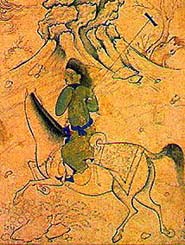If you connected polo with response "c," you were correct. The vast majority of U.S. citizens are most commonly exposed to the sport through newsclips depicting British royalty playing the game; Prince Charles, for example, is an avid polo player. Other associations with polo include its primarily male participants and activities like fox-hunting, which are also conducted on horseback and by primarily wealthy male participants.
As is the case with golf, the origins of polo's cultural symbolism derive in part from the great expense the sport  entails. Prince Charles can afford a stable of horses and membership at a polo club which maintains the grounds; a food server in Lubbock, Texas, or a farmhand in Oklahoma (though s/he may be a terrific rider), probably won't have the financial means to play polo on a regular basis.
entails. Prince Charles can afford a stable of horses and membership at a polo club which maintains the grounds; a food server in Lubbock, Texas, or a farmhand in Oklahoma (though s/he may be a terrific rider), probably won't have the financial means to play polo on a regular basis.
Interestingly, polo doesn't enjoy a long tradition of patronage by European royalty. In fact, the cultural meanings we associate with the sport are probably much newer than meanings attached to, say, golf. According to Ralph Hickock,
Polo originated in Persia between the sixth century B.C. [or B.C.E.] and the first century A.D. [or C.E.]. The sport spread to Arabia, China, Japan, and Tibet, where it got its name--the ball is made of willow wood, and pulu is the Tibetan word for Willow. About 700 years ago, it arrived in India. The first Europeans to play polo were British tea planters in Assam, who founded a polo club in 1859. Then the sport was discovered by British Army officers, who in 1863 organized three clubs. Shortly afterward polo was brought to England by returning officers. (358)
In the 135 years since polo migrated from India to Europe (and to the U.S. shortly thereafter), its stiff economic requirements and its popularity among British royalty have helped create the cultural meanings which govern our current perceptions of the sport. This is a good example of how the systems of meaning which constitute a given culture can grow and change over time to incorporate new meanings, even as older meanings and associations reproduce themselves.
Return to:
 |
|  |
| 
[sports/association quiz, skateboarding, golf, gymnastics, polo, bowling, Learned Behaviors Gallery, What Is Culture? page]
 entails. Prince Charles can afford a stable of horses and membership at a polo club which maintains the grounds; a food server in Lubbock, Texas, or a farmhand in Oklahoma (though s/he may be a terrific rider), probably won't have the financial means to play polo on a regular basis.
entails. Prince Charles can afford a stable of horses and membership at a polo club which maintains the grounds; a food server in Lubbock, Texas, or a farmhand in Oklahoma (though s/he may be a terrific rider), probably won't have the financial means to play polo on a regular basis.

